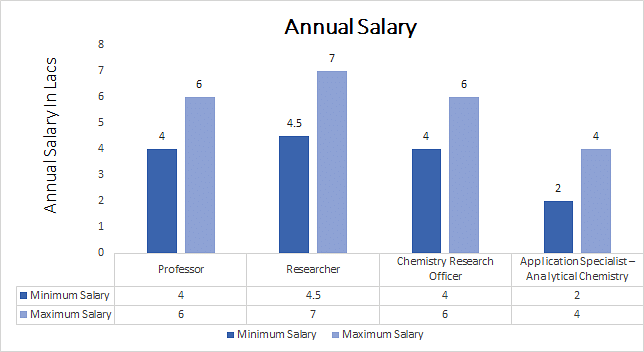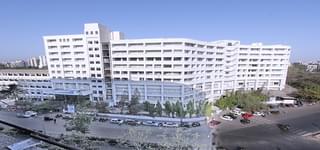Ph.D Physical Chemistry Latest Updates
06 Aug, 2025 IIT Guwahati will conduct the GATE 2026 exam on February 7, 8, 14, and 15, 2026; registration starts from August 25, 2025, @gate2026.iitg.ac.in. Read News Here
Ph.D. in Physical Chemistry is a 3-year full-time doctorate course. The minimum eligibility for which is a 55% score in the Master's degree pursued from a recognized university. Admission to the course depends on a candidate’s performance in the relative entrance test conducted by the universities followed by a round of personal interview. Some universities do not conduct an entrance examination and admit candidates on the basis of their overall merit in the Master's degree.
Ph.D. in Physical Chemistry is a popular career choice especially for the candidates keen to know and research about the physical chemistry domain. The program combines the qualitative and quantitative concepts related to research, development and application of the physical chemistry science.
The average tuition fee for Ph.D. in Physical Chemistry course ranges from INR 6000- INR 24,000 per year for three years of study. Such postgraduates get to work in the field of research and teaching, laboratories, nanotechnology, utilities and energy research etc. The average salary for the ones working in the industry ranges from INR 3,50,000- INR 4,50,000 whereas the ones in the teaching field earn INR 4,00,000 on an average in the beginning.
Table of Contents
- Ph.D. in Physical Chemistry: Course Highlights
- Ph.D. in Physical Chemistry: What is it About?
- Ph.D. in Physical Chemistry: Top Institutes
- Ph.D. in Physical Chemistry: Eligibility Criteria
- Ph.D. in Physical Chemistry: Admission Process
- Ph.D. in Physical Chemistry: Syllabus and Course Description
- Ph.D. in Physical Chemistry: Career Prospects
Ph.D. in Physical Chemistry: Course Highlights
| Course Level | Doctorate |
| Duration of the Course | 3 years |
| Examination type | Semester (Annual in some colleges) |
| Eligibility | 55% score in the 2 year Masters degree pursued from a recognized university |
| Admission Process | Entrance exam based |
| Course Fee | INR 6,000- INR 24,000 annually |
| Average Starting Salary | INR 3,50,000- INR 4,50,000 |
| Top Recruiting Companies | Colleges and Institutes, Research Labs and organizations |
| Job Positions | Lecturer, Professor, Researcher |
Ph.D. in Physical Chemistry: What is it About?
Ph.D. in Physical Chemistry is a program designed in such a way that it equips the student with the complete theoretical as well as practical aspects of the physical chemistry arena. The course curriculum includes numerous seminars and training that help in learning more about the quantitative aspects of the course.
The program is built so that students develop the acumen to understand the intricacies of physical chemistry and its application in the field of chemistry. Ph.D. in Physical Chemistry course is research heavy and the candidates have to present a thesis at the end of their academic curriculum. During the course, students can also opt for electives and coursework that very well aligns with their career prospects.
The primary aim of Ph.D. in Physical Chemistry course is to produce well trained physical chemists who possess the right knowledge of the field and can use it for the betterment of mankind. The rigorous course schedule prepares the candidates for all the challenges ahead of their way.
Ph.D. in Physical Chemistry: Top Institutes
| NAME OF THE INSTITUTE | LOCATION | ANNUAL COURSE FEE |
|---|---|---|
| Changu Kana Thakur Arts, Commerce and Science college | Raigarh | INR 24000 |
| Shivaji University | Kolhapur | INR 11,500 |
| Guru Nanak Khalsa College of Arts, Science and Commerce | Mumbai | INR 4,000 |
| KJ Somaiya Arts, Science and Commerce College | Mumbai | - |
Ph.D. in Physical Chemistry: Eligibility Criteria
Candidates willing to get admission in the Ph.D. in Physical Chemistry program must fulfil the below mentioned eligibility criteria:
- Candidates must possess a minimum score of 55% in the Master's degree pursued from a recognized university.
- Candidates must obtain the minimum cutoff score of the entrance exam taken into consideration by the respective institutes.
Ph.D. in Physical Chemistry: Admission Process
Admission to the Ph.D. in Physical Chemistry course depends on a candidate’s performance in the relevant entrance examination conducted by the respective institutes. This is followed by the round of interview of the candidate with a panel of evaluators.
Admission process generally varies from institute to institute. While some colleges conduct an entrance examination, there are many other that admit candidates on the basis of their merit in the Master's degree. Some of the entrance exams conducted for admission in the doctorate course are as follows:
- PhD Entrance Test (PET)
- CSIR UGC NET Exam
Ph.D. in Physical Chemistry: Syllabus and Course Description
| Subjects of Study |
|---|
| Mathematical Introduction |
| Phenominological Kinetics |
| Phenominological Thermodynamics |
| Electrochemistry |
| Hamiltonian and Langrangian Formalisms |
| Statistical Thermodynamics |
| Fundamentals of Quantum Mechanics |
| Hydrogen Atom Perturbation Theory |
| Vibration Theory |
Ph.D. in Physical Chemistry: Career Prospects
Ph.D. in Physical Chemistry is an excellent career option for the candidates keen to learn the physical concepts of chemistry. Such postgraduates work the field of research, food and drink industry, utilities and energy research etc. Candidates willing to work in the teaching arena can work as professors and lecturers at national institutions.
Their starting salary is about INR 4,00,000 on an average which keeps increasing with an increase in one’s experience and expertise.

| JOB PROFILE | JOB ROLE | AVERAGE STARTING SALARY (In INR) |
|---|---|---|
| Professor | Imparts the knowledge about intricacies of physical chemistry in the young students | 4 to 6 Lacs |
| Researcher | Researches further in the domain to discover more about the field | 4.50 to 7 Lacs |
| Chemistry Research Officer | Study the aspects of gravitational waves, stem cell biology, evaluate, analyze, interpret and document the data for thesis generation. | 4 to 6 Lacs |
| Application Specialist – Analytical Chemistry | Carrying out electro-chromatography using the samples for analysis, prepare documents and list out the specifications of the product. | 2 to 4 Lacs |



![Indian Institute of Science - [IISc]](https://image-static.collegedunia.com/public/college_data/images/appImage/1562240371cover.jpg?h=150&w=320&mode=stretch)
![Indian Institute of Science - [IISc]](https://image-static.collegedunia.com/public/college_data/images/logos/139486567811.png?h=30&w=30&mode=stretch)




![Sri Sathya Sai Institute of Higher Learning - [SSSIHL]](https://image-static.collegedunia.com/public/college_data/images/appImage/25377_SSSIHL_APP.jpg?h=150&w=320&mode=stretch)
![Sri Sathya Sai Institute of Higher Learning - [SSSIHL]](https://image-static.collegedunia.com/public/college_data/images/logos/uv25377.jpg?h=30&w=30&mode=stretch)
![Changu Kana Thakur Arts, Commerce and Science College - [CKT]](https://image-static.collegedunia.com/public/college_data/images/appImage/790_changu_new.jpg?h=150&w=320&mode=stretch)
![Changu Kana Thakur Arts, Commerce and Science College - [CKT]](https://image-static.collegedunia.com/public/college_data/images/logos/1748314974CKTNameBannertop.jpg?h=30&w=30&mode=stretch)









Comments